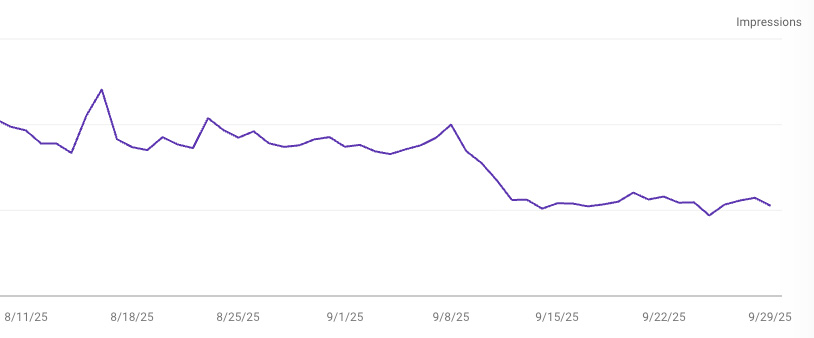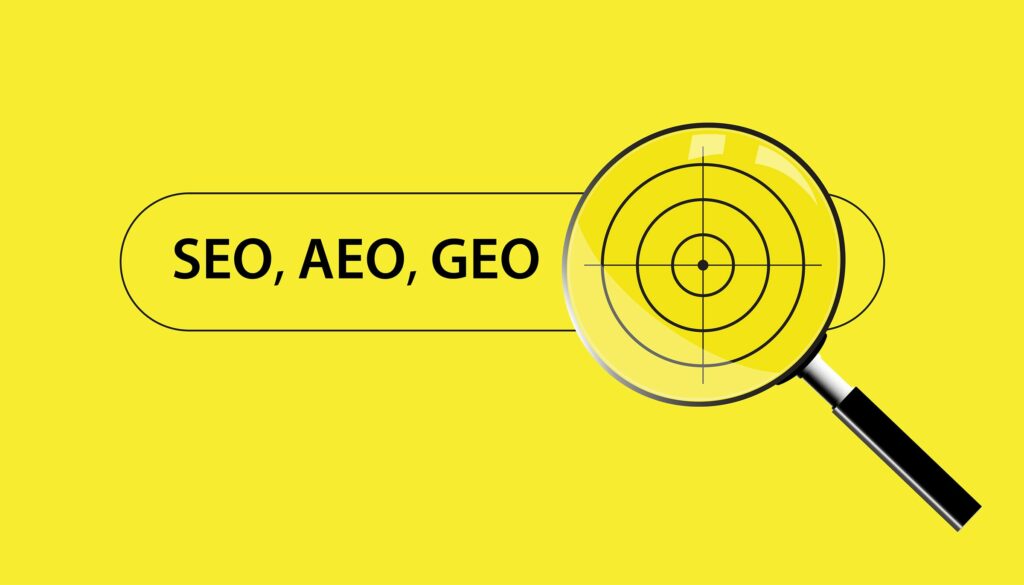Early in September, Google rolled out one of the biggest algorithm updates in years, internally codenamed “Perspective”. This is a fundamental shift in how Google looks at and ranks websites, moving beyond keyword optimisation to a more advanced assessment of content quality, expertise and user satisfaction.
If you’ve been monitoring your analytics, you may have seen some turbulence in the SEO landscape over the last few weeks, commencing around the 8th. 9th. 10th of September. While 40% of websites across the internet have seen big ranking fluctuations, we’re happy to report that our clients have been stable, with no big keyword ranking drops or significant organic traffic drops.
What is the “Perspective” Update
The Perspective update introduces advanced AI techniques that change how Google ranks. Instead of just matching keywords, Google is now evaluating if your content truly satisfies user intent through four core pillars:
1. Expertise Depth
Google’s algorithm is now looking at content for real understanding beyond surface-level keyword usage. Pages that show real expertise (backed by analysis, examples and nuanced insights) are being rewarded with higher rankings. Generic, thin content no longer competes even if it’s technically optimised.
2. User Journey Completion
The update prioritises pages that allow users to achieve their goal without having to go back to Google for another search. This “journey completion” metric directly targets user satisfaction, favouring comprehensive resources that answer questions thoroughly and provide clear next steps.
3. Fresh Perspective Value
Original insights and new information now get preference over content that just recycles common knowledge. Google is promoting websites that bring unique perspectives and thought leadership to their industry.
4. AI Content Detection
The update also uses advanced AI detection to distinguish between human-generated content and low-effort AI output. While AI tools can support content creation, Google rewards quality and authenticity: content that shows real expertise and original thinking.
The September 2025 Context
The Perspective update didn’t happen in isolation. September 2025 brought several compounding factors that affected the SEO landscape:
- Technical Disruptions: Google removed the “&num=100” search parameter, which has broken many SEO rank tracking tools. Many platforms can now only track the top 10 to 20 results per query, making comprehensive ranking analysis more difficult.
- Reporting Anomalies: Webmasters reported volatile rankings and confusing metrics, including big drops in impressions and rising average ranking positions. This was partly due to Google Search Console reporting issues and changing user behaviour driven by growing AI-generated search overviews.
- Cumulative Updates: The September changes built on top of the earlier spam and core algorithm updates from 2024 and early 2025, intensifying Google’s focus on content quality, authority, mobile usability and user value.
Winners and Losers: What the Data Shows
Like any major algorithm update, this created a clear divide between websites that aligned with new rules and those that didn’t.
Winners: Authority-Driven, User-Focused Content
Comprehensive Guides and Topic Hubs: Websites with in-depth, well-researched guides covering multiple angles have performed extremely well. These resources establish authority and are one-stop shops for users.
Authentic Expertise and First-Hand Reviews: Content showing real-world experience has been rewarded. This includes detailed product reviews from actual users, case studies with verifiable data and articles written by professionals with proven credentials.
Optimised Local Businesses: Businesses with robust and engaging Google Business Profiles have seen big gains. The update rewards local businesses that actively manage their profiles, gather reviews and provide useful location-specific information.
Losers: Outdated Tactics and Superficial Content
Thin, Keyword-Stuffed Pages: Websites with low word count articles that repeat keywords unnaturally have seen big traffic drops. This content offers no value and doesn’t satisfy user intent.
Affiliate Listicles Without Real Reviews: Generic “best of” lists clearly designed for affiliate revenue without product testing or unique insights have been heavily penalised.
E-commerce Sites Lacking Educational Content: Online stores with only product pages and minimal content have struggled. The update favours e-commerce sites that also provide buying guides, how-to articles and other valuable information to help customers make informed decisions.
The New Reality: Optimising for AI-Powered Search
Beyond traditional search rankings, a parallel revolution is reshaping how users find information: AI-powered search through Google’s AI Overviews, ChatGPT, Perplexity and similar platforms. The Perspective update aligns with how these AI engines evaluate and cite sources.
Why GEO (Generative Engine Optimisation) Matters Now
AI search tools increasingly provide direct answers rather than lists of links. This means your content needs to be not only findable but citable. Success now requires being recognised as an authoritative source that AI engines trust enough to reference, quote and recommend.
GEO Strategies to Implement
Citation Worthy Content: AI engines prioritise authoritative, well-structured content. Focus on creating definitive resources that AI can confidently cite. Include clear author credentials, cite your own data and research and provide transparent sourcing.
Optimise for Conversational Queries: Users interact with AI search tools differently, asking complete questions in natural language. Structure your content to answer full questions, not just target keywords. Use question-based headers and provide direct answers.
Structured Data: Implement schema markup (Article, Product, Review, LocalBusiness, FAQ) to help AI engines understand your content’s purpose and extract key information accurately. This increases your chances of being cited in AI-generated responses.
Multi-Modal Content: AI increasingly analyses images, videos and other media. Optimise images with descriptive alt text, provide video transcripts and ensure infographics have accompanying text explanations.
Entity-Based Authority: Move beyond keyword optimisation to establish your brand as a recognised entity in your field. Build relationships between related topics, consistently demonstrate expertise and create interconnected content that establishes topical authority.
Areas of Focus for Modern SEO and GEO
To succeed in this new environment, businesses need to refine their approach across several key areas.
1. Mobile Optimisation is Non-Negotiable
Google now evaluates mobile and desktop versions of your site with separate considerations for user behaviour. A poor mobile experience directly signals low quality.
Mobile-First Behaviour: Google analyses how users interact with your site on mobile devices. Slow load times, difficult navigation and unresponsive design elements on mobile can lead to penalties even if your desktop site is flawless.
Core Web Vitals for Mobile: Metrics like Largest Contentful Paint (LCP), First Input Delay (FID) and Cumulative Layout Shift (CLS) are critical for the mobile experience. A slow, clunky mobile site will struggle to rank. Ensure your site is fast, responsive and easy to use on all screen sizes.
2. Advanced Local SEO Strategies
For businesses serving specific geographic areas, local SEO has become more complex than just maintaining correct NAP (name, address, phone) information.
Contextual Proximity and Community Authority: Google now considers your business’s relevance to the local community. This includes mentions in local news, participation in community events and partnerships with other local organisations. Building authority within your community translates to higher visibility in local search results.
Google Business Profile as an Active Hub: Your Google Business Profile is a primary tool for local engagement. Regularly update it with posts, photos and responses to reviews.
Use the Q&A feature to answer common customer questions.
A well-maintained profile signals to Google that your business is active and customer-focused.
3. Technical SEO as Your Foundation
A strong technical foundation is more important than ever, helping both traditional search engines and AI crawlers understand and index your content efficiently.
Content Clustering and Internal Linking: Organise your content into topic clusters. Create a central “pillar” page for a broad topic and link to more specific “cluster” pages. This structure signals your expertise on a subject and improves navigation for users, search engines and AI crawlers.
Advanced Schema Markup: Implement comprehensive schema markup to give search engines and AI explicit context about your content. Use specific types like Article, Product, Review, LocalBusiness, FAQ and HowTo to help algorithms understand each page’s purpose and increase chances of rich snippets and AI citations.
Core Web Vitals: Continue to monitor and improve your Core Web Vitals. A technically sound website that loads fast and provides a stable user experience is rewarded with better visibility across all search platforms.
5 Step Recovery and Future Proofing Strategy
Whether your site was impacted by the update or you’re preparing for future changes, these concrete steps will strengthen your digital presence.
Step 1: Audit Your Content for Intent Fulfilment
Review your key pages and ask yourself if they truly solve the user’s problem. Does your content fully answer the questions someone might have when searching for your target keywords? Update or expand pages that provide thin or incomplete information. Focus on delivering tangible value rather than just hitting a word count. Ask yourself if AI would find your content worth citing.
Step 2: Shift from Keywords to Topic Clusters
Move away from a keyword strategy. Instead, identify the core topics your audience cares about and build content clusters around them. This approach naturally builds topical authority and helps you rank for a wider range of long tail queries. It demonstrates deep understanding of your niche and positions you as the go-to resource AI engines will reference.
Step 3: Mobile User Experience
Audit your mobile site. Use Google’s PageSpeed Insights to find issues and follow its recommendations. Test your site on various mobile devices to find and fix usability problems. Make sure forms are easy to fill out, buttons are tappable, and text is readable without zooming.
Step 4: Add Original Insights
Make it a priority to add value to every piece of content you publish. This could be conducting your own surveys, sharing data from your business or providing detailed case studies with real results. Content that adds something new to the web is highly prized by Google and AI search engines. Original research and first-hand expertise make your content citable.
Step 5: Treat Content as a Living Product
Your content is not a “set it and forget it” asset. Schedule regular reviews of your key pages to update statistics, add new information and refresh outdated examples. Treating your content as a product that requires ongoing maintenance ensures it remains relevant, valuable and meets evolving search standards.
Need help implementing these strategies? Our team has guided clients through this transition successfully, maintaining stable rankings while 40% of websites experienced disruption. Get in touch to discuss how we can future-proof your digital presence.
Our Approach: Protecting Your Advantage
We’ve been preparing for this shift. Our focus on quality content, genuine expertise and user experience has put our clients in a good position to weather this update. Here’s how we’re maintaining your advantage:
- Content Excellence: We prioritise content that demonstrates real expertise, answers comprehensively and offers unique perspectives relevant to your industry. Our content is designed to be rankable and citable.
- User Centric Design: We ensure your website allows complete user journeys, so visitors can find answers and take action without needing to search elsewhere. This meets traditional search metrics and AI-powered discovery.
- Authentic Voice: We help you develop and communicate your brand perspective, differentiate you from competitors through original insights and thought leadership. This builds the authority that AI engines look for when citing sources.
- Technical Foundation: While content quality is key, we maintain robust technical SEO so Google and AI crawlers can understand and index your pages. This includes comprehensive schema markup and site architecture.
- Continuous Monitoring: We’re tracking your performance metrics, including keyword rankings, organic traffic and emerging AI search visibility to find opportunities and address challenges proactively.
Moving Forward: The New Search Landscape
The Perspective update shows Google’s commitment to delivering relevant search results, and the rise of AI search adds another layer to digital visibility. For businesses that invest in quality content and authentic expertise, this is a big advantage.
To succeed in this new world:
- Show genuine expertise through detailed, well-researched content that search engines and AI can trust
- Create comprehensive resources that satisfy complete user journeys and are citation-worthy
- Develop unique perspectives that add original value to industry conversations
- Optimise for conversational queries that reflect how users interact with AI search tools
- Balance technical optimisation with content quality and user experience across all platforms
- Build an entity-based authority that establishes your brand as an expert in your field
- Keep consistency in publishing fresh, relevant content that evolves with your audience
From Rankings to Recognition
While the September 2025 Perspective update has affected many websites, it’s also an opportunity for businesses that put quality and user value first. We’re here to help you navigate this changing landscape and maintain your advantage.
Our clients have remained stable through this transition, and we’re focused on positioning you for growth in both traditional search and AI-powered discovery. The future of digital visibility isn’t just about ranking on page one; it’s about being a trusted, authoritative source that search engines and AI platforms recommend to users.
The future belongs to brands that educate, inform and serve their audience, and we’re here to help you lead the way.





